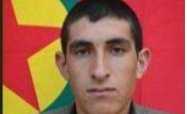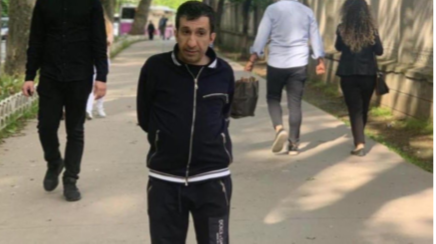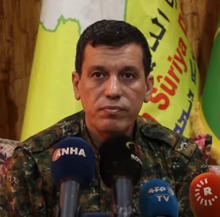Al-Monitor sheds light on how two Ukrainian men were taken hostage by a Kurdish militant group that was scammed by Ukrainian crooks in a million dollar plus arms trafficking deal.
KYIV — On a recent morning in Schevchenko Park in central Kyiv, Ukraine, a tall man wearing dark sunglasses, a black crew neck jumper and matching shoes draws on a Sobranie cigarette, distinguishable by its signature gold foil filter as he scans the crowd. The scene feels like something out of a Cold War spy thriller, and the saga in which he’s enmeshed is the stuff of one too.
Yevgeny Fomenkov, 47, a self-described “Robin Hood,” was held captive along with fellow Ukrainian Alexander Sanpiter, 46, by militants of the outlawed Kurdistan Workers Party (PKK) in the mountains of Iraqi Kurdistan for three and a half years until they were freed in December 2020.
They are lucky to be alive. On Feb. 10, Turkish special forces backed by attack helicopters and fighter jets launched a massive attack on Gare, a mountainous region south of the Turkish border in Iraqi Kurdistan and a strategic foothold for the PKK. The purpose of the operation appeared to be twofold — to chase the rebels out of Gare and to rescue 12 Turkish security personnel, military conscripts, policemen and intelligence officers who were being held there in a cave. The result was a blood-drenched mess. All 12 Turkish hostages and a man later identified as an Iraqi Kurdish informant were killed.
The Turkish government insists they were shot dead by the PKK. The PKK says the men perished when Turkish F-16s dropped bombs on the cave — the very same subterranean complex where Fomenkov and Sanpiter were being held before the militants let them go. “I can confirm that our comrades held the Ukrainians in that cave before setting them free in last December near a village in Dahuk,” a PKK commander authorized to speak on the matter told Al-Monitor in a March 17 interview via Signal. “They had a narrow escape,” the commander said.
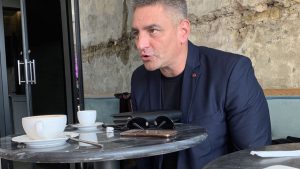
Yevgeny Fomenkov, a Ukrainian entrepreneur who was held hostage by the PKK, is pictured at a cafe in Kyiv during an interview with Al-Monitor.
Had the Turkish government agreed to negotiate with the rebels for its citizens’ freedom, “they would still be alive as well.” Had the Ukrainian government done that for Fomenkov and Sanpiter? Not quite.
Al-Monitor’s two-month-long investigation into the events that led a pair of small-town Ukrainians to end up in the hands of a militant group that has been waging an armed campaign against the Turkish state since 1984 reveals a trail of corruption and deceit topped with poor judgment in the murky underworld of arms trafficking.
Dirty deals
Fomenkov and Sanpiter’s introduction to the PKK began through a certain Oleg Kalashnikov, described by Ukrainian media as a former intelligence official who headed the government department for combatting the illegal transfer of drugs and weapons in the town of Kharkiv in northeastern Ukraine. His partner was Taras Savin, a fellow Ukrainian who had dabbled unsuccessfully in local politics in a pro-Russian party.
In May 2017, the pair allegedly met with PKK operatives in Kyiv to arrange the purchase and transfer of weapons and ammunition, including Russian Igla MANPADS, sniper rifles, night-vision goggles, thermal imagers and frequency jammers from the local market. A deal was struck. The Ukrainians promised to deliver the equipment in a cargo plane to the city of Sulaimaniyah in Iraqi Kurdistan, once the PKK gave them a million-dollar advance. The PKK agreed, but they had one rock-hard condition: The rebels would hold two of their Ukrainian associates as collateral until they took possession of the goods.
Sayin approached Fomenkov and Sanpiter, telling them there was a lucrative oil contract to be struck in Iraq. It was fast and easy money. Would they be interested? They were. Savin said nothing about weapons.
On June 13, Savin arrived in Sulaimaniyah with Fomenkov and Sanpiter in tow. The PKK made the million-dollar payment in Savin’s presence. It is unclear whether the transaction was made in cash or electronically. The PKK commander declined to comment. Savin took off, assuring the Kurds that the weapons would arrive the following day. They never did.
No surprises there. Kalashnikov and Savin would have hardly been able to arrange the transfer of weapons to the PKK, which is designated as a terrorist entity by the United States, the European Union and the United Nations, through legal channels and on a plane. The PKK had been scammed.
The PKK commander corroborated the conditions and timeline of the deal, though he did not identify either Savin or Kalashnikov by name, referring to them merely as “the Ukrainian fraudsters.” He confirmed that PKK operatives had seized Fomenkov and Sanpiter from their hotel in Sulaimaniyah once it became clear the weapons would never arrive.
Weeks had gone by since Savin had disappeared with the money and Kalashnikov had stopped answering the PKK’s calls. The PKK took Fomenkov and Sanpiter to one of their bases in the province of Kirkuk further north. Their three-and-a-half-year ordeal had begun.
An Iraqi Kurdish official familiar with the scheme told Al-Monitor, “This isn’t the first time the PKK’s been played like this.” He declined to elaborate.
It’s unclear why the Kurds would have turned to Ukraine for weapons to begin with. The former Soviet state enjoys strong diplomatic and trade ties with Turkey, particularly in the fields of security and defense. Ukraine produces engines for Turkey’s Akincis, the high-altitude, long-endurance drones that are proving lethally effective in Turkey’s campaign against the PKK. Ukraine has deported Turkish nationals accused by Ankara of terrorism, most recently in January. Rights groups denounced the move as an illegal rendition.
The outbreak of the conflict in eastern Ukraine in 2014 between Ukraine and Russian-led forces has led to the proliferation and trafficking of weapons within the country. Matt Schroeder, a senior researcher at the Small Arms Survey, a Geneva-based outfit monitoring illicit weapons flows, who co-authored a January 2021 report on Ukraine, said, “There are cases of diversion in which aircraft are used to illicitly transport large quantities of arms and ammunition to armed groups in foreign countries, but these transfers are less common than people think.”
“MANPADS are generally the most tightly guarded conventional weapons system in a country’s arsenal. I have seen no reports of international trafficking of Igla MANPADS from Ukraine,” Schroeder added in emailed comments to Al-Monitor.
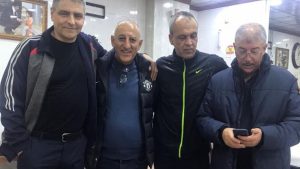
From left to right: Yevgeny Fomenkov, Nahro Ali (a Syrian Kurdish doctor from Ukraine), Alexander Sanpiter and Farhad Ali Shakir at a roadside restaurant en route from Dahuk to Erbil following the Ukrainians’ release in December 2020. (Photo courtesy of Nahro Ali)
In any case, a flourishing black market of military equipment exists in Iraq, including “some more advanced weaponry that the PKK relies on,” said Aliza Marcus, the author of “Blood and Belief,” the most authoritative book on the PKK in the English language. “They also capture weapons in clashes with Turkish soldiers. So certainly, weapons are not a problem, and the PKK has the funds to buy them,” she said. Where does the money come from? “Taxes on smugglers crossing PKK-held territory, and so-called donations from businesses in areas where the PKK is active, particularly in Turkey,” she explained. Marcus continued, “I have no doubt that the Turkish state’s crackdown on the PKK inside Turkey has had an impact on the group’s ability to gather money, but as people in the PKK have long explained to me, running a guerrilla war is cheap. Think about it — a PKK fighter gets some uniforms, guns and that’s it. There’s no salary.”
‘Heval Jiyan’
On March 3, Fomenkov sat down for his first-ever interview with a journalist at the Bubble Cafe in Shevchenko Park. It took over a month to get him to agree. His face twitched and his hands shook as he raised an espresso cup to his lips. “We thought we were going to do honest business in Iraq. We had no idea what these swindlers were up to,” he recalled, speaking through a Russian interpreter. How was life in captivity? Was he ill-treated by the rebels? “No. They never hit us.” Does he know that the cave they were being held in had been bombed by the Turkish military? “No.” Had he seen any Turkish captives or other foreigners in the cave? “No.” Had they been moved around to different places? “No.” The PKK commander told Al-Monitor that the men had been moved around “from mountain to mountain” as a “security precaution.”
Fomenkov had said he was ready to tell his story prior to the meeting, but now he says his lips are sealed, that he cannot provide any details of his ordeal until a government investigation he said was being carried out on Kalashnikov and Savin was completed. “If justice isn’t delivered,” he added “I will expose everything, I mean everything, even at the cost of my life. It will be like a bomb. Are you ready for it?”
Could he at least describe the surroundings, the food, how they spent their time? “How do you think three and a half years in a dark cave, with no sunlight, could be?” The PKK commander said the men were occasionally allowed outside “when there were no Turkish drones lurking in the air.”
Had they picked up any Kurdish? He starts speaking in Kurmanji, the main Kurdish dialect spoken by the Kurds of Turkey and northern Syria. Al-Monitor’s ethnic Turkish-Bangladeshi reporter responds in her own pidgin Kurmanji. It feels surreal.
The food was “Kurdish food, you know how it’s like.” He lost eight teeth, he says, pulling his lips back to reveal the gaps. In the early days of their captivity, the PKK had allegedly put nails in the Ukrainians’ food. The PKK commander dismissed the claim, saying Fomenkov’s teeth were likely broken by “stones in the bulgur that went undetected by our comrades. It happens to us too.”
Fomenkov offered no explanation. His sympathy for the rebels begins to seep through. “They are proud people, fighting for justice, like me. I help people who cannot defend themselves, women who are abused.” He says he has read the ramblingly obscure treatises of Abdullah Ocalan, the imprisoned PKK leader, who champions gender equality. “He is writing very wise books. I gained wisdom,” Fomenkov said.
Had the PKK given him a code name? His face lights up for the first time. “Yes, the hevals called me ‘Jiyan.’ It means ‘life,’” he said. “Heval” is the Kurdish term for “comrade.” Sanpiter was accorded the more prosaic “Iskender,” the Arabized version of Alexander.
“All I can tell you for now,” Fomenkov said, “is that my experience in the mountains was like my first love: unforgettable.”
Sanpiter declined Al-Monitor’s repeated requests for an interview.
The whistleblower
For a full year and a half, only a handful of people were aware of the Ukrainians’ plight. In August 2017, Sanpiter had been allowed a phone call to the Ukrainian Embassy in Baghdad, one of his last before his mobile was confiscated by the rebels. Earlier he made several calls to his wife, Tatiana, in Kharkiv. Sanpiter told them he and Fomenkov were being held by an unidentified armed group. The government had to save them. Fomenkov is divorced and estranged from his only child, a daughter. He had nobody to call.
Their story did not surface until Evgeny Schevchenko, a veteran volunteer in Ukraine’s war against the Russians in the Donbass region, revealed it in a Jan. 29, 2019, blog on the Ukrainian censor.net news site. Schevchenko, who runs “a security business,” had heard about the pair from his Kurdish contacts during a trip to Sulaimaniyah in 2018. Following his return to Ukraine, Schevchenko had, together with former Ukrainian lawmaker Semyen Semenchenko, contacted Ukraine’s “foreign intelligence service” for help. (It later emerged that Schevchenko was the source of the claims that the PKK had been spiking their captives’ food with nails.)
Sanpiter’s wife had already lodged a criminal complaint with local authorities in Kharkiv soon after learning of her husband’s plight. “A joint group of the National Police, the Security Service of Ukraine, the Ministry of Defense, the Foreign Intelligence Service and the Ministry of Foreign Affairs was established to investigate the affair. Kalashnikov protested his innocence. In the end, this group of investigators came to a simple conclusion: Neither Kalashnikov nor any other person was involved in the scam, and the money was stolen by the same Kurds who came to Ukraine because they were not the buyers of the weapons but only intermediaries. For some reason, no one is interested in the fate of the Ukrainian hostages,” Schevchenko wrote.
Following his interrogation, Kalashnikov allegedly threatened Sanpiter’s family, telling Tatiana she would be “unable to protect their children.”
Schevhenko made no mention of the PKK. The Ukrainian media, which picked up his story, didn’t either.
In a March 16 interview with Al-Monitor via WhatsApp video, Schevchenko acknowledged he knew the PKK had been holding his compatriots. He had succumbed to COVID-19 and was coughing a lot. He said he had traveled to Sulaimaniyah in the hopes of landing a contract with the US-led coalition to protect oil fields in northeastern Syria controlled by the Kurdish-led Syrian Democratic Forces, which have close ties to the PKK.
The coalition had successfully repelled an attack by Russian mercenaries from the Wagner Group in February 2018, and the Syrian Kurds were looking for Western partners to modernize the dilapidated oil infrastructure and boost production. They would ideally provide security as well. Moti Kahana, a Jewish American entrepreneur, was lobbying for just such a deal and had introduced Syrian Kurdish officials to Erik Prince, the controversial US security contractor and former CEO of Blackwater, in January 2019 in Washington, DC, Al-Monitor has learned. Ilham Ahmed, the executive co-chair of the Syrian Democratic Council, confirmed to Al-Monitor via WhatsApp that she had met with Prince at the Marriott Hotel in Washington, DC, but that “no agreement of any kind was made.” Schevchenko said he had failed to strike one as well.
The negotiator
On June 5, 2018, the PKK shot two separate videos of Fomenkov and Sanpiter that found their way to Sanpiter’s wife. In one of them, Sanpiter addresses Savin.
“You took me and exchanged me for money, and now it turns out you are threatening my family. I will definitely be back soon. If even so much as a hair falls off my family’s head, if even so much as a chestnut falls on them as they are walking down the street, you will regret it very much,” he warns. In the other, Fomenkov says, “I am Evgeny Fomenkov, and I am still alive. Until the money is found, I apparently will be here.”
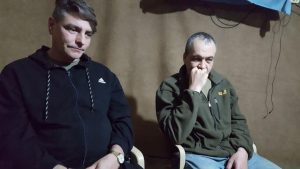
Still from a proof of life video shot June 3, 2018, by the PKK showing Yevgeny Fomenkov and Alexander Sanpiter.
The PKK was, however, beginning to accept that the money was gone for good. “We realized these guys were innocent and had been used by the fraudsters, and that the money wasn’t ever going to come,” the PKK commander said. “So we told the Ukrainian authorities that if they wanted their citizens to be freed they’d need to prosecute and jail those fraudsters first. We demanded justice.”
There was no direct contact between the PKK and the Ukrainian government. Four months after the video was filmed, the message was relayed by a Syrian Kurdish PKK operative who went by the name “Sipan,” the commander said. Sipan met with Schevchenko at the revolving rooftop restaurant of the Grand Millennium Hotel in Sulaimaniyah on Oct. 11. Another Syrian Kurd was present at the meeting, Schevchenko said. His name was Farhad Ali Shakir, a Syrian Kurdish businessman and Ukrainian national who introduced himself as Ukraine’s honorary consul in Erbil. A senior Iraqi Kurdish official said Shakir was not recognized as Ukraine’s consul by the Kurdistan Regional Government. “We have informed the Ukrainian Embassy in Baghdad of this matter. He is Syrian, not Iraqi, and is close to the PKK.”
Ukrainian intelligence had approached the Kurdistan Democratic Party (KDP), one of the two main political groups holding power in the Kurdistan Regional Government, for help. But the KDP had declined to involve itself, having already failed to secure the release of the Turkish hostages, according to sources familiar with the affair. KRG officials declined to comment.
Whether he was “close to” the rebels or not, Shakir’s access to the PKK proved a boon. He stepped in and began to negotiate. “I secured the release of Fomenkov and Sanpiter,” Shakir said in a WhatsApp exchange with Al-Monitor. The PKK commander and Schevchenko confirmed that Shakir deserved the credit.
Pressed for details, Shakir said he would have to “seek permission from Ukrainian intelligence” in order to say more. When contacted anew, he offered instead to talk about how he had arranged the repatriation of nine Ukrainian women and children from Al Roj camp in northeastern Syria, one of two facilities where the families of Islamic State fighters are held. “Permission” had apparently not been granted. Shakir subsequently said he was in the hospital and has not responded to further messages.
Free at last
On Dec. 9, 2020, the office of Ukrainian President Volodymyr Zelensky, the comedian turned politician who was elected on an anti-corruption platform in 2019, announced that “two citizens captured in Iraq in 2017 have returned to Ukraine.” Their return had been made possible by “the joint work of the Office of the President of Ukraine, the country’s Foreign Ministry and other government agencies,” it said. There was no mention of either Shakir or the PKK.
The men had been taken from the cave in Gare to an area known as Deralog, 30 kilometers south of the Turkish border, where they were met by Farhad, the PKK commander said. From there they were escorted to Sulaimaniyah. Ukrainian security officials who had arrived for the handover accompanied Fomenkov and Sanpiter on a commercial flight to Istanbul, where they spent 12 hours before flying home to Kyiv.
“Our expectation remains that Ukrainian authorities arrest and punish the perpetrators of this fraud,” the PKK commander said.
Zelenksy’s office referred Al-Monitor’s queries about whether Kalashnikov and Savin were currently under investigation as Fomenkov claimed as well as on the circumstances of his and Sanpiter’s release to the Ukrainian Embassy in Washington. The embassy did not respond to Al-Monitor’s request for comment. Reports in the Ukrainian press said Savin and Kalashnikov “remained at large.”
Schevchenko said he wasn’t aware of any ongoing investigation of either Kalashnikov or Savin and he was unaware of their whereabouts.
On March 24, Ukraine’s national intelligence service (the SBU) announced that Schevchenko and his ex-lawmaker friend, Semenchenko, had been arrested in connection with an “illicit weapons supply scheme” and the creation of “an illicit private army” that consisted of more than 150 people, and that there was “evidence of contracts between them and representatives of various organizations in the Middle East.” Schevchenko and Semenchenko deny the accusations and claim they are being framed by “pro-Russian” forces.
Fomenkov has been offline since March 13.








